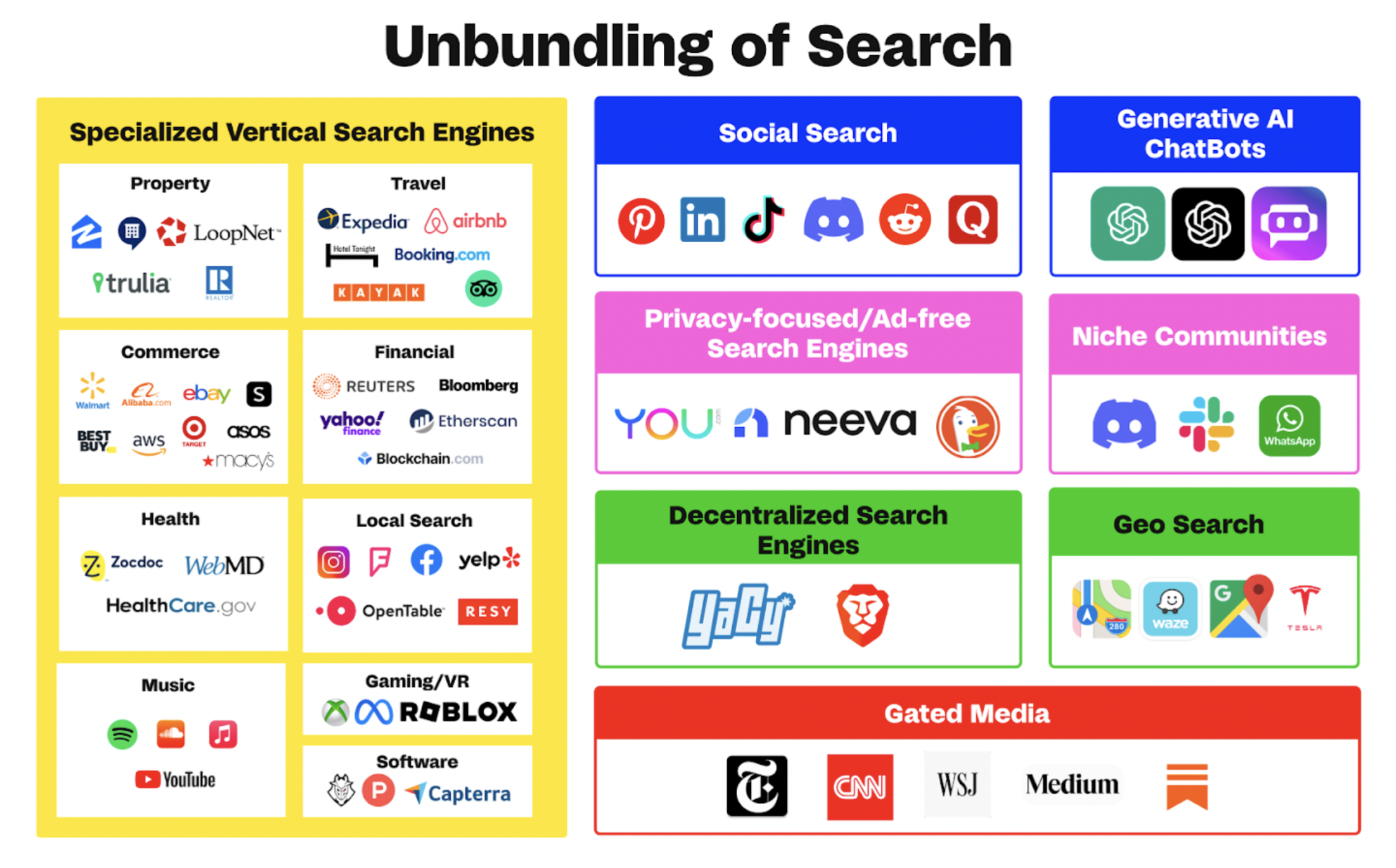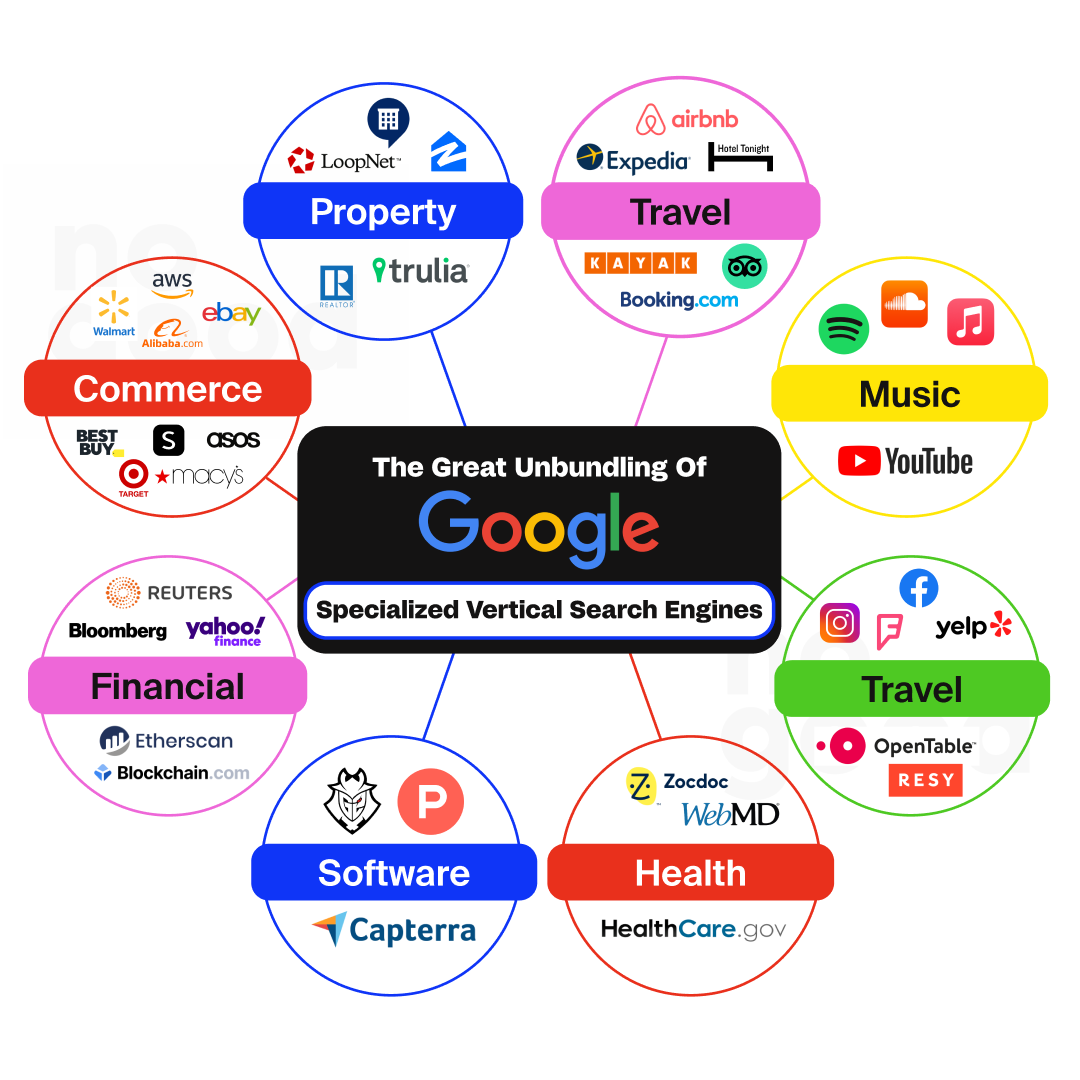Google, our gateway to the internet, is facing unprecedented threats. A company that has led the way in the past two decades in tech innovation is now busy playing catchup on various fronts — and the Bing x ChatGPT development is only one of these fronts.
The purpose of Google Search has always been to answer our questions by acting as a gateway to the web. The problem is, today’s web is far larger and more complex than the early days; it’s bigger than any single company’s ability to roam and effectively synthesize it. As a result, Google’s ability to index, analyze and serve us information is being challenged. Google today is spread too thin and is struggling to provide the leading user experience it used to have, leaving room for niche, vertical and modality-specific players to eat into its nearly $250 billion search pie.
Let’s explore how some of these challenges will play out.

Before Generative AI, There Was Social Search
TikTok
In 2022, Google reported that 40% of Gen Z audiences choose to use social search on platforms such as TikTok and Instagram over Google. Credit Karma reported similar numbers in their research in 2021, showing that Gen Z are searching for content around financial education on TikTok.
TikTok is able to offer a visually engaging and socially-validated search experience that is more useful than simple Google results. TikTok surfaces the videos that have the highest engagement first and is able to crack the code on matching a text query to the right videos.
Pintererst
Pinterest overtook Google as the go-to visual search engine primarily because it was born as a platform for visual inspiration and ideation. A quick scroll through Pinterest would reveal an endless trove of jaw-dropping pictures, colorful knitting projects or DIY tutorials. The way that Pinterest’s algorithm is built is similar to the TikTok For You page model — as users interact with certain pins, the platform learns about their tastes and sends personalized suggestions based on their viewing history.
Another search platform that’s posing a serious threat to Google is Reddit — the “front page of the internet” that’s currently the 9th most visited website in the US. The strength of Reddit’s search capabilities lies in its ability to build strong communities through an algorithm-free system of organic upvotes and downvotes. What this means is that popular content will rise to the top of the page, and unpopular posts will be “downvoted to oblivion,” — often hidden from the community. This organic form of user-driven interaction provides users with a sense of trust and social validation, making Reddit a better place than Google for authentic recommendations and opinions.

Self-cannibalization with generative AI
Google has been an uncontested leader in NLP and generative AI for almost a decade. The challenge, or the innovator dilemma, is that they had a $250 billion dollar search business that was alive and well. Google likely knew that launching a chatbot like Bard would impact their core search business — and I get it, why would they risk killing their golden goose?
Despite their high cost of compute, there is a clear value that LLM chatbots bring, and chatGPT’s rapid success is proof of that. Unlike Google search, ChatGPT and even Bard are a superior zero click UI that is sequential, accretive and conversational. It lends itself to more integration and applicability into various use cases, introducing a new frontier of innovation around answering questions online.
The potential of self-cannibalization was likely a real concern here. With generative AI giving users ready-to-consume answers with zero clicks, Google will face the dilemma of not being able to send as much traffic to websites as before. The ad business that is search and link click based will likely be impacted as well. As more and more users rely on Bard, it’s likely that publishers or businesses will see Gating and charging for subscriptions as a better model than waiting for Google’s diminishing ‘free” traffic.
Looking forward, we’re already seeing that ChatGPT is only the beginning of generative AI. Last week, Quora launched their chatbot Poe, and the reaction has been positive so far.
Creators and publishers are gatekeeping quality content
With the rise of an equitable creator economy and the push for a more sustainable content revenue model, we are seeing a shift towards an internet where quality content is mostly paywalled or gated in some manner. Creators, publishers (e.g. The New York Times), and creator platforms like Substack and Medium are trying to take more ownership over their content and charge monthly subscriptions for access.
This move towards paywalls poses a risk to Google by reducing the amount of quality content accessible. Even when these content pieces are made partly accessible to capture search traffic, the user experience remains less than ideal.
Consumers know where to go for specialized search
Specialized or vertical search is by no means a new trend, but it will likely continue to get better as AI tech becomes more accessible. These search engines provide highly relevant results that cater to users’ needs and preferences. In short, consumers know where to go to find exactly what they need, and companies compete to give them the answers they are searching for.

Commerce Search: Amazon, the uncontested leader of commerce search, has surpassed Google for product searches. Today, over 60% of US online shoppers start their product search on Amazon.
In addition to Amazon, users also have access to other smaller specialized commerce search engines like Etsy for handmade and crafts products, Best Buy or NewEgg for electronics, and Shein or ASOS for fashion.
Much like commerce search, every niche category now has a specialized search engine that provides more relevant, actionable and helpful results than Google does.
Travel Search: Airbnb, TripAdvisor, Kayak, Booking
Financial Search: Bloomberg, Reuters, Etherscan, Blockchain.com
Prop Search: Zillow, Trulia, LoopNet, StreetEasy, Realtor
Software Search: G2, Product Hunt, Capterra
Health Search: ZocDoc, WebMD
Music Search: Spotify, SoundCloud, Youtube, Apple Music
Local Search: Instagram, Yelp, FourSquare, Resy, OpenTable
Niche Communities and the peer-to-peer search
It’s common in today’s overwhelmingly influence-and-ad-heavy internet to see people seeking answers from like-minded niche communities that are built on top of tools like Slack, Discord and Whatsapp. Often referred to as “dark social,” this is a similar mechanism to what we have seen in forums in the early days of the internet.
Mapping to the right destination isn’t enough
It’s no longer enough to just direct users to the right location; today’s geo search and map apps have to rise to consumer behavioral shifts and provide users with the ability to discover the right destination, by giving socially-validated and experience-driven recommendations on top of driving directions and traffic information. Unsurprisingly, the intersection of geo/map search and social media has been the target of many players like Instagram but also Foursquare and Yelp. Social maps provide users with information on the best places to eat, drink and shop anywhere, making them more useful than a straightforward Google Maps result.
Decentralized search is growing
The demand for privacy and security will drive the development of decentralized search engines. Decentralized search engines like YaCy or Brave Search allow users to search for information without having to share their personal data with centralized entities.
Google’s feedback loop, the home field advantage
Google still has a competitive edge in certain regards. For one, they have a strong AI team that is now under real pressure to prove themselves against the rising popularity of ChatGPT. Google also has more data than any other player due to the fact that they have been working on the case the longest. Google has built a strong brand and product shield at multiple levels, including the device level (Google Phone), OS level (Android), browser level (Chrome), infrastructure level (Google Cloud) and enterprise software level (G Suite).
Google also has a massive Feedback Loop Advantage. The advantage of owning the search interface that displays multiple answers to a query and often the browser is that Google can gather data on user engagement such as bounce rates and time spent on page to continually improve the quality of the results. This feedback loop allows for continuous improvement and learning. ChatGPT, on the other hand, provides a single, definite result when a query is entered. Although it allows for explicit feedback from the user through a thumbs up/down or regenerated response and a text box, it lacks the implicit data feedback loop that would enable it to improve results through user engagement.
Google has a significant advantage in this aspect due to a larger volume of queries and its technology being under the same company umbrella, facilitating the sharing of data needed for an efficient feedback loop. OpenAI, on the other hand, is playing in a foreign product territory.
Will Google Come Out and Dance?
Google is facing the consequences of being spread too thin, becoming slow to innovate and its evident lack of search focus. By attempting to tackle too many areas and use cases at once, their current approach lowers the quality of its final product and risks getting unbundled to smaller niche players in a space it once dominated.
Generative AI, the rise of social search and competition over vertical search could dethrone Google from its longstanding dominance over the search industry.






